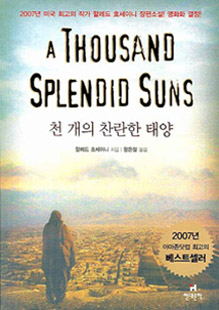
In 2003, Khaled Hosseini, an Afghan-American novelist, appeared in the American literary world and created a great sensation through his work, The Kite Runner. His second book, A Thousand Splendid Suns, also became a topic of conversation. Khaled Hosseini portrays the Afghan’s gloomy situation through two women’s miserable destinies and self-sacrifice.
The two women, Mariam and Laila, are left in the swirl of war and come to meet each
other as the wives of one man. Mariam is an extramarital daughter of a wealthy businessman and is forced to marry 40-year-old Rasheed at the age of 15. However, Mariam can’t bear a child and so she gets brutal treatment from Rasheed. Eighteen years later, Rasheed takes a second wife, a 14-year-old. Lalia worked as a prostitute after her parents were killed by rocket fire during the civil war. In an unending war situation, Mariam and Laila, who have to live with a pitiful destiny, become allies.
Their life story keeps on going with faith and hope even though they suffer from poverty, discrimination, and ceaseless life-threatening violence. In addition, their story is about that of mothers who strive to protect their child at the sacrifice of their blood or flesh.
Hosseini gives a strong lesson but, on the other hand, he points out the patriarchal system in which women are dependent either on their fathers or on their husbands. The book's story clearly depicts the miserable situation of Afghanistan, but it also evokes our emotions and feelings of hope through the two patient women characters.
After reading A Thousand Splendid Suns, the Gazette thought we should be concerned about many suffers in underdeveloped countries such as Afghanistan and try to share their problems, too. The Web site www.UNrefugees.org will show you the state of inhuman hardship they suffer and how you can help to understand their suffering.








